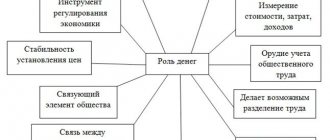What is respect for a person? Definition.
RESPECT
is a feeling based on recognition of someone's merits, merits, qualities; respect.
RESPECT
being one of the most important requirements of morality, it presupposes: justice, trust in people, careful attention to their beliefs and aspirations.
RESPECT —
This is a respectful attitude based on recognition of someone else. advantages; in morality - one of the most important requirements in relations between people, based on recognition of their personal dignity.
Respect is manifested in appropriate actions, actions, motives, etc., as well as in the social conditions of society.
The concept of “respect” that has developed in the moral consciousness of society presupposes: justice, equality of rights, the fullest possible satisfaction of people’s interests, providing them with freedom; trust in people, attentive attitude to their beliefs and aspirations; sensitivity, politeness, delicacy, modesty. Violations of the requirement of respect for people are: unjustified and cruel violence, oppression, injustice, suppression of freedom, inequality, humiliation of dignity, mistrust, rudeness. The content of the concepts of “respect” and “disrespect” is determined by the nature of society and its inherent social relations.
Understanding other people's boundaries
A lot of cruelty and injustice in the world occurs because people cannot accept each other. They argue because of different worldviews, characters, and habits.
A civilized society cannot exist without mutual respect. After all, we are all different and we all deserve acceptance. Respect for others can and should be manifested in the absence of judgment towards them. The ability to accept others with their imperfections. There are so many pointless arguments about how to live properly. But no one knows the right way.
Do not confuse respect and admiration. A person doesn't have to do something great to be respected. It is enough that everyone is an individual .
You can't demand respect from others if you don't respect anyone yourself. It must be mutual. Namely:
- there is no need to approach people with advice that they did not ask for;
- judge their appearance;
- condemn their work;
- laugh at those who are different.
Tactless questions are disrespectful. If a person does not feel comfortable answering them, then asking only out of curiosity is impolite.
Of course, there are always rude people, boors and bullies. But, as a rule, if you take a good look at such a person, you can understand that in his soul he is unhappy. He doesn't love himself, so he hates this world. He believes that he was treated unfairly, and therefore everyone owes him. As a rule, such people do not have self-respect.
Collocations with the word "respect"
Definitions (adjectives-epithets)
Great, deep, deepest, greatest, sincere, special, deserved, general, universal, mutual... respect.
Compatibility:
Respect for someone or something: (about a person) (about who or what respects) ~ people around, colleagues, everyone, Mukhina... society...; respect for someone: (about a person) (about who or what is respected) ~ parents, father, teacher, surrounding ... smb. independence, smb. someone's labor merit, someone's someone's knowledge feelings .. Respect for someone: (about a person) ~ for smb. to a person, to parents, to father, to teacher, to people, to elders, to adults, to [oneself], to Anya... to smb. labor, to smb. to someone's merit knowledge, to whose feelings about someone's experience, about someone's. age, to the dignity of a person... Feelings, signs... of respect. To provide to someone, to show (colloquial) to someone, to inspire someone, to nourish (literally) to someone, to feel to someone, to evoke from someone. … respect; deserve, lose... someone's respect; to instill in someone... respect for someone. To be worthy of... respect. To take advantage of, to take advantage of someone. ...respect. As a sign of respect for someone, out of respect for someone. (to do something ~, to provide some kind of service). With respect, without respect (to treat someone or talk to someone) O Such a courageous act deserves respect. Well, as soon as you lose respect for yourself, then disappear here (Dostoevsky).
Epithets for the word “business”
General, good, noble, godly, magnanimous, magnificent, humane, delicate, good, respectable, legal, righteous, right, beautiful, reasonable, bright, holy, glorious, just, good, honest, pure, hopeless, urgent, useless, big, important, great, minor, high, ruinous, hot, civil, loud, delicate, living, vital, everyday, mysterious, intricate, confusing, difficult, earthly, significant, golden, interesting, convict, painstaking, large, easy, personal, small, small, petty, dead, minute, polysyllabic, laborious, tricky, folk, real, urgent, impossible, quiet, uninteresting, necessary, urgent, unrealizable, unhurried, not urgent, insignificant, new, necessary, ordinary, ordinary, responsible, careless, forced, useful, half-vocal, habitual, simple, empty, trivial, risky, routine, secret, second, serious, boring, complex, bold, hasty, controversial, urgent, mysterious, secret, subtle, difficult, labor-intensive, troublesome, extraordinary, emergency, illegal, immoral, heartless, shameless, shameless, dishonorable, vile, dirty, bad, villainous, evil, malicious, insidious, phony, vile, fraudulent, gloomy, unseemly, unkind, obscene, unreasonable, unclean, low, deceitful, disgusting, bad, vile, shameful, shameful, vulgar, treacherous, criminal, terrible, shameful, dark, black, sinful, impossible.
Arguments from literature in the direction of “Loyalty and betrayal”
In any final essay, first of all, arguments from literature are valued, which show the degree of erudition of the author. It is in the main part of his work that he demonstrates his abilities: literacy, prudence, erudition, and the ability to beautifully express his thoughts. Therefore, when preparing, it is important to focus your attention on what works will be needed to cover the topics, and what episodes will help reinforce the thesis. This article contains 10 arguments in the “Loyalty and Betrayal” area, which will be useful in the process of writing practice essays, and maybe even in the exam itself.
- In A. N. Ostrovsky’s drama “The Thunderstorm,” the heroine faces a difficult choice between loyalty to the deep-rooted traditions of the city of Kalinov, where stupidity and narrow-mindedness reign, and freedom of feeling and love. Treason is the highest manifestation of freedom for Katerina, the rebellion of her soul, in which love overcomes conventions and prejudices, ceases to be sinful, becoming the only salvation from a depressing existence in the “dark kingdom.”
- “Everything passes, but not everything is forgotten” - and true fidelity knows no time boundaries. In the story by I.A. Bunin's "Dark Alleys" the heroine carries love through the years, leaving in her life full of everyday life, a place for the first and most important feeling. Having met her lover who once abandoned her, who has aged and become a complete stranger, she cannot get rid of bitterness. But the woman is unable to forgive the long-standing offense, since the price for loyalty to failed love turns out to be too high.
- In the novel L.N. In Tolstoy's War and Peace, the paths of fidelity and betrayal are often intertwined. Staying faithful for Natasha Rostova, due to her young age and inexperience, turned out to be a difficult task. Her betrayal of Andrey is accidental and is seen more as a mistake of a girl inexperienced in love affairs, weak, subject to the influence of others, rather than as betrayal and frivolity. Caring for the wounded Bolkonsky, Natasha proves the sincerity of her feelings, showing spiritual maturity. But Helen Kuragina remains faithful only to her own interests. The primitiveness of feelings and the emptiness of the soul make it alien to true love, leaving room only for numerous betrayals.
- Loyalty to love pushes a person to heroic deeds, but it can also be destructive. In the story by A.I. Kuprin's "Pomegranate Bracelet" unrequited love becomes the meaning of life for the petty official Zheltkov, who remains faithful to his high feelings for a married woman who will never be able to reciprocate his feelings. He does not defile his beloved with demands for reciprocal feelings. Tormented and suffering, he blesses Vera for a happy future, does not allow vulgarity and everyday life to penetrate the fragile world of love. In his loyalty there is a tragic doom to death.
- In the novel by A.S. Pushkin's "Eugene Onegin" fidelity becomes one of the central themes. Fate constantly forces heroes to make decisions on which their personal happiness depends. Evgeny turns out to be weak in his choice, gives in to circumstances, betraying his friendship and himself for the sake of his own vanity. He is unable to take responsibility not only for a loved one, but also for his own actions. Tatyana, on the contrary, remains faithful to duty, sacrificing her interests. In this renunciation is the highest manifestation of strength of character, the struggle for inner purity, in which a sense of duty overcomes love.
- The strength and depth of human nature is known in love and loyalty. In the novel by F.M. Dostoevsky's "Crime and Punishment" heroes, tormented by the severity of their crimes, are not able to find solace in the external world. In each other they see a reflection of their own sins, and the desire to atone for them, to find new life meanings and guidelines, becomes a common goal for them. Each of them wants to hear words of forgiveness from the other, each is looking for salvation from the pangs of conscience. Sonya Marmeladova shows courage by going to Siberia for Raskolnikov, and with her loyalty she transforms Rodion, resurrected by her love.
- In the novel by I.A. Goncharov’s “Oblomov” the theme of fidelity is reflected in the relationships of several characters at once. The love of Olga Ilyinskaya and Ilya Oblomov is a collision of two worlds, beautiful in their romance and spirituality, but unable to coexist in harmony. Even in love, Olga is true to her ideas about the ideal lover, whom she tries to create from the sleepy, inactive Oblomov. She makes attempts to transform the hero, who lives in a cramped little world artificially created by him. Agafya Pshenitsyna, on the contrary, is trying to protect Oblomov’s sleeping soul from shocks, supporting his comfortable existence in the realm of carefree family happiness and comfort. She is infinitely devoted to him, and in blind obedience to her husband's whims, she becomes the indirect cause of his death. The servant Zakhar is also faithful to Oblomov, for whom the master is the embodiment of true heroism. Even after the death of Ilya Ilyich, a devoted servant takes care of his grave.
- Loyalty is, first of all, awareness of responsibility, renunciation of one’s own interests and selfless appeal to another person. In the story by V.G. Rasputin's "French Lessons" district school teacher Lidiya Mikhailovna faces a difficult moral choice: to help a starving student using a non-pedagogical method, or to remain indifferent to the grief of a child who needs her help. The question of professional ethics here ceases to be dominant, giving way to compassion and tenderness for a capable boy. Loyalty to human duty becomes for her higher than conventional ideas about morality.
- Loyalty and betrayal are opposite phenomena, mutually exclusive. But, one way or another, these are two different sides of the same choice, morally complex and not always unambiguous. In M. A. Bulgakov’s novel “The Master and Margarita,” the heroes choose between good and evil, duty and conscience. They are faithful to their choice to the end, even one that brings them a lot of mental suffering. Margarita leaves her husband, actually committing betrayal, but, in her devotion to the Master, she is ready to take the most desperate step - to make a deal with evil spirits. Her loyalty to love justifies her sins, because Margarita remains pure before herself and the person she wants to save.
- In M. A. Sholokhov’s novel “Quiet Don” the themes of fidelity and betrayal are revealed in the relationships of several characters at once. Love ties closely connect the characters with each other, creating ambiguity in situations in which it is difficult to find happiness. Loyalty here comes in many forms: Aksinya’s passionate devotion is different from Natalya’s quiet, unrequited tenderness. In a blinding desire for Gregory, Aksinya cheats on Stepan, while Natalya remains faithful to her husband to the end, forgiving dislike and indifference. Grigory Melekhov, in search of himself, turns out to be a victim of fatal events. He is looking for the truth, in favor of which he is ready to make a choice, but the search is complicated by the ups and downs of life, which the hero cannot cope with. Grigory's mental tossing, his vain readiness to be faithful to the end only to truth and duty is another personal tragedy in the novel.
Author: Valeria Pronina
Interesting? Save it on your wall!



